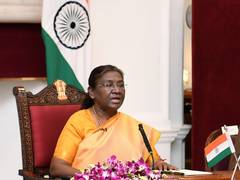ICMR releases 32 new standard treatment workflows for common and serious diseases
New Delhi [India], July 25 (ANI): The Indian Council of Medical Research (ICMR), in collaboration with the National Health Authority (NHA) and WHO India, has released 32 new Standard Treatment Workflows (STWs) for common and serious diseases.
The new STWs cover five specialties, including cardiothoracic vascular surgery, paediatric cardiology, interventional radiology, neurosurgery, and orthopaedics, adding to the 125 STWs previously released across 23 specialties in 2019 and 2022.
During the Volume-IV launch of Standard Treatment Workflows at ICMR, Department of Health Research (DHR) Secretary and ICMR Director General Rajiv Bahl emphasised the significance of these protocols and said that these standard protocols save lives and improve the quality of care.
“By incorporating these workflows into medical education from the beginning, we strengthen the foundation of our healthcare professionals. We also aim to disseminate these workflows to healthcare insurance companies, healthcare centres, central health systems, and medical professional bodies,” Rajiv Bahl said speaking on occasion.
National Health Authority (NHA) Chief Executive Officer Deepti Gaur Mukerjee shared her positive outlook on the collaboration and highlighted future plans.
“Our joint initiative with ICMR for the development of these workflows has been a fruitful endeavour. We’ve put considerable effort into broadening the specialties encompassed by the STWs. Looking forward, specialties such as burn management, plastic surgeries, and polytrauma will take centre stage in our future efforts. Our aim is to persistently enhance patient care by covering a more diverse range of medical fields through our STWs,” Deepti Gaur Mukerjee said.
Endorsing the STWs, Member NITI Aayog Vinod Kumar Paul said, “These vital tools have been the guiding light since inception, shaping a resilient future. These evidence-based and trusted workflows ensure that patients receive the right treatment, while standardisation helps healthcare professionals follow guidelines effectively.”
“Transformative and reliable, they guarantee accurate patient care. Standardisation empowers healthcare professionals to easily adhere to guidelines, ensuring effective treatment protocols for all. Let’s not just know but apply these STWs, instilling pride in India’s healthcare system,” VK Paul said.
Senior Deputy Director General and Head Delivery Research at ICMR Ashoo Grover highlighted the impact of these STWs and said that the dissemination of the STWs has been remarkable, both nationally and internationally.
“Our collaboration with National Institute of Health & Family Welfare (NIHFW) has resulted in the publication of three manuscripts in PubMed-indexed journals. The development of these workflows is a challenging process, aiming to streamline healthcare in India. By incorporating STWs into practice, physicians can provide targeted treatment, while the public gains confidence in the healthcare system,” he said.
The ICMR introduces evidence-based STWs to enhance medical care consistency in India. These guidelines, created by national experts, promote optimal treatment practices, rational drug use, and efficient healthcare services. Each concise one-page document outlines key actions for physicians, ensuring uniform healthcare standards in India’s public healthcare system.
The Indian Council of Medical Research (ICMR) remains committed to advancing standardised and evidence-based care through the development and implementation of the Standard Treatment Workflows (STWs). These workflows not only empower healthcare professionals but also ensure the provision of high-quality care to patients across the country.




